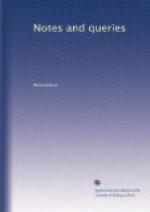“I dwell on this,” said Dr. Anster, “because the accidental mention of Toddington seems to authenticate the book: the name of Lady Henrietta Wentworth does not occur in it, and the persons in whose hands the book has been since it was purchased in Paris do not seem to have noticed the name of Toddington, or to have known that it had any peculiar relation to the duke’s history. It occurs twice in the book—once in the itinerary, and again in a trifling and unmetrical song, which is probably the duke’s own composition; written probably on the eve of his flight with his romantic but guilty companion to Holland:—
“’With joy we leave thee,
False world, and do forgive
All thy false treachery.
For now we’ll happy live.
We’ll to our bowers,
And there spend our hours;
Happy there we’ll be,
We no strifes can see;
No quarrelling for crowns,
Nor fear the great one’s frowns;
Nor slavery of state,
Nor changes in our fate.
From plots this place is free,
There we’ll ever be;
We’ll sit and bless our stars
That from the noise of wars
Did this glorious place give
(Or did us Toddington give)
That thus we happy live.’”
In Macaulay’s history we find that the latest act of the duke on the scaffold, before submitting to the stroke of the executioner, was to call his servant, and put into the man’s hand a toothpick-case, the last token of ill-starred love. “Give it,” he said, “to that person!” After the description of Monmouth’s burial occurs the following affecting passage:—




